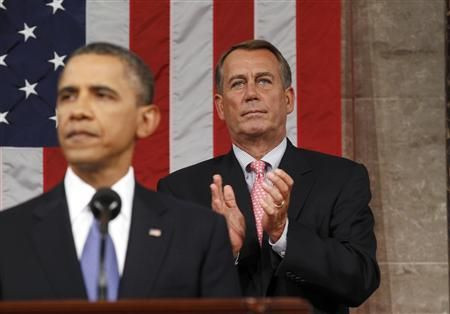Payroll Tax Cut: House Republicans Present Counter Legislation

House Republicans have proposed a bill extending the payroll tax cut that includes a provision to push through the controversial Keystone XL pipeline and reform several social safety net programs, openly defying a veto threat by President Barack Obama.
Two other attempts at extending the cut died in the Senate, as bills introduced by both parties failed to garner the 60 votes needed to overcome a filibuster.
The House bill keeps the payroll tax paid by employers and employees at its reduced rate of 4.2 percent, covering the cost by setting stricter limits on affluent Americans' access to benefit programs such as Medicare, food stamps, and unemployment, while also freezing pay rates for federal workers. It would also reduce the jobless benefits to 59 weeks, from the current 99.
It's a solid plan, said Representative Paul D. Ryan, R-Wis., I like the unemployment reforms quite a bit.
Republicans plan on bringing the bill to a vote next week, though weeks of intra-party sniping left its odds of passage through both houses of Congress positive, but not guaranteed; passage in the Republican-controlled House is likely. It stands as a counter to several bills introduced by Senate Democrats, which have decreased the tax while leveraging the lost revenue through surtax on income over $1 million.
Senate Democrats Probably Won't Like Several Bill Items
The GOP's bill includes several provisions that make it anathema to Democratic goals, by largely gutting Environmental Protection Agency regulations on pollutants produced by commercial and industrial boilers, as well as preventing the agency from introducing new ones in the future.
Obama held a brief press conference in light of the bill, decrying Republican attempts at lacing provisions into the legislation that he promised would be grounds for a veto.
Rather than trying to figure out what can they extract politically from me in order to get this thing done, what they need to do is be focused on what's good for the economy, what's good for jobs and what's good for the American people, Obama said.
Two bills similar to ones introduced in the past failed to overcome a filibuster. The Democratic bill garnered 50 votes, while the GOP's version had 22 votes in favor, with a majority of Republicans voting against it. The outcome was similar to an attempt by both parties to gauge support last week, when competing bills were both felled by procedural hurdles.
The extension of the tax cut, which would largely benefit middle class Americans, has become a bulwark issues for Democrats, who insist on covering the cost of the legislation by imposing a surtax on high income earners. Senate Democrats adopted the bill, a major chunk of Obama's languishing jobs plan, two weeks ago and have hoped to portray Republican opposition as defenders of the rich, in a populist light in their favor.
Obama has pushed Congressional members to remain in the Capitol until a palatable deal is signed, promising to skip his usual holiday jaunt to his home state of Hawaii if necessary. If Congress fails to reach an agreement by the new year, the payroll tax will return to its old 6.2 percent rate, costing many families about $1,500 per year.
© Copyright IBTimes 2024. All rights reserved.





















